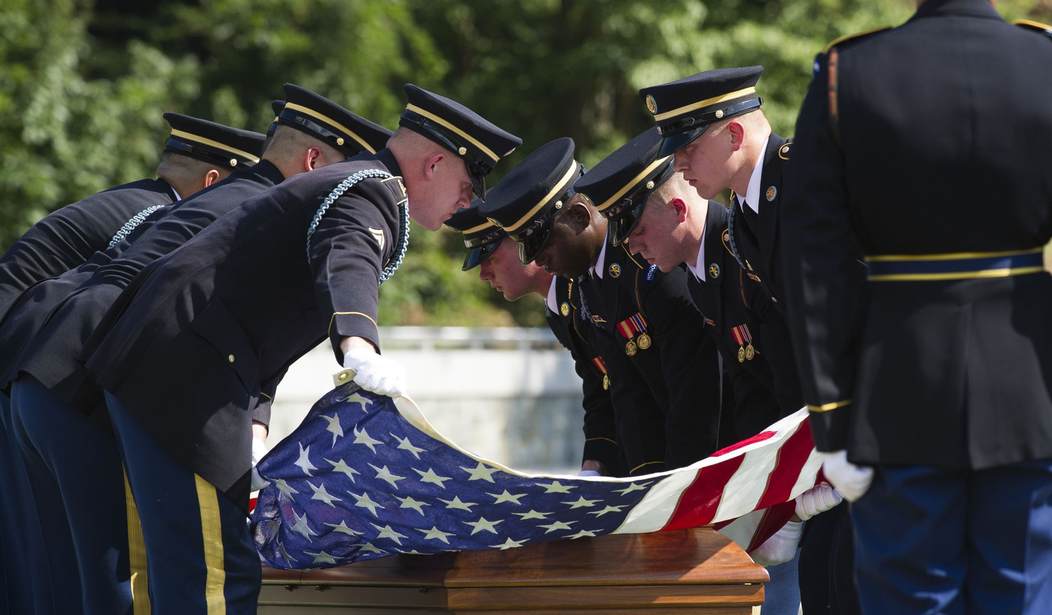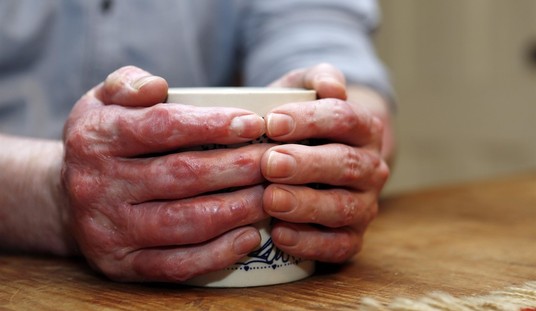Today is Memorial Day, a holiday to honor and appreciate the hundreds of thousands of American men and women who gave the last full measure of devotion, making the ultimate sacrifice, so that we could enjoy our freedoms. From the American Revolution up to our present day, America was founded upon, and survives because of, the military members who bled and died for our country.
I have three ancestors who died while serving, two Army soldiers in the Civil War and a Marine in Vietnam. But as we are all brothers in liberty and patriotism, every man who died in America’s wars died both for his relatives and for strangers, putting us in a debt we can never fully repay. I want to highlight just a few of the many honored dead whom we remember today.
I learned the story of young PFC. Milton Olive III at the National Museum of the United States Army. After Olive went off to fight in the Vietnam War, he wrote home, “I’m over here in Never Never Land fighting this hellish war.” Sadly, that “hellish war” took his life when he was still only a teenager:
In October 1965, Olive and his platoon were moving through the jungle when they were surprised by an ambush. In the midst of the firefight, a grenade landed near Olive and four other Soldiers. He grabbed it in his hand and fell on it, letting his body take the full force of the blast. With no hesitation, he sacrificed his life to save the other four. He was posthumously awarded the Medal of Honor: “For conspicuous gallantry and intrepidity at the risk of his life above and beyond the call of duty.”
Olive was the first black soldier to be awarded the Medal of Honor for the Vietnam War.
Union soldier Cpl. William Calvin Hileman of Pennsylvania was killed during the First Battle of Kernstown (March 1862), the only tactical loss of Confederate Rebel Gen. “Stonewall” Jackson. Hileman’s story was recorded at the Kernstown Battlefield’s museum and in the Winchester Star. For William C. Hileman, not even a mortal wound could immediately stop him from firing—in fact, Hileman shot seven enemy soldiers after receiving the wound that would kill him.
Wm. Hileman, who was seriously wounded [in several places], managed, with great pain, to get upon his side and fired seven rounds at the enemy, resting his rifle upon a rail, and each ball found its victim.
Sadly, young William Hileman died at the hospital in Winchester, Virginia, on March 29, 1862, primarily of a wound where a bullet passed through his lung. But Hileman died as he lived—a brave, talented, and dedicated soldier.
Shizuya Hayashi is one of the largely forgotten Japanese-American military heroes of World War II. As Americans turned on ethnic Japanese at home and Japan proved a powerful enemy abroad, Hayashi fought with almost stunning courage for the U.S. military. Hayashi, drafted into the U.S. Army in March 1941, distinguished himself on November 29, 1943, the day after his 26th birthday, in what must have seemed at the time to his fellow soldiers to be a suicidal charge near Cerasuolo, Italy:
From the heights, the camouflaged Germans opened up with 88-mm cannons, taking out many US troops. Hayashi rose up amid the hail of grenade, rifle, and machine gun fire and charged a German machine gun nest. Firing his Browning automatic rifle from the hip, he cleaned out the nest, killing seven and dropping two more as they fled.
Hayashi’s platoon caught up with him and advanced another 200 meters (600 ft). Hayashi faced a counterattack and killed nine more Germans and took four prisoners. A terrified teenage German soldier held up his gun, but Hayashi just couldn’t make himself shoot the crying kid. He told him to get up and took him prisoner. One of his captives had an Iron Cross, and Hayashi took it as a souvenir.
Hayashi, who miraculously came through unscathed except for a bullet graze on his neck, was awarded the Distinguished Service Cross, which was later “upgraded” to the Medal of Honor. “I was just standing up and shooting. Things happened so fast that now it seems so crazy,” Hayashi recalled.
To end, I go back to the dawn of America’s military. John Laurens was born in South Carolina, to the wealthy Henry Laurens, owner of no fewer than eight plantations—and many slaves. Eventually, slavery became a dividing line between father and son, as Henry Laurens worked for America’s freedom in the Revolution while justifying his ownership of slaves; while John insisted that slavery had to be abolished, or the Americans would rightly be considered hypocrites.
Chafing at his legal studies in London while the Revolution was going on, Laurens arrived back in the colonies in April 1777. Despite his father’s disapproval, he volunteered to serve on General George Washington’s staff. Passionate, aggressive, and fluent in French, Laurens quickly became friends with the Marquis de Lafayette and Alexander Hamilton. Both of them, like Laurens, believed to a greater or lesser degree that slavery was evil. Hamilton and Laurens were both eager to distinguish themselves on the battlefield, and Laurens was sometimes courageous almost to the point of recklessness. “It was not his fault that he was not killed or wounded, he did everything that was necessary to procure one or t’other,” Lafayette observed wryly after the 1777 Battle of Brandywine.
Laurens was actually injured at the Battle of Germantown soon after, but his courage earned him the status of Washington’s official aide-de-camp. The young South Carolinian distinguished himself further at the August 1778 Battle of Rhode Island. And when the incompetent Gen. Charles Lee began slandering Washington after Lee was court-martialed, Laurens challenged and defeated the general in a duel.
But always John Laurens kept the cause of the slaves close to heart, as he aspired not only to end slavery but to give rights to black Americans. While some battalions in the Revolutionary army had black soldiers integrated in them, like the famous “Indispensables” and “Immortals,” in 1779 Laurens petitioned Congress for permission to form an all-black battalion. Sadly, he could not raise the 3,000 South Carolinian men he had hoped for, but his written hopes illustrate his good intentions; “We Americans, at least in the Southern Colonies, cannot contend with a good Grace, for Liberty, until we shall have enfranchised our Slaves.”
Laurens was taken prisoner by the enemy when the British took Charleston, but was eventually paroled. He then went to France as special minister, and was instrumental in ensuring French naval support for the colonists, which was key in the American victory that led to the end of the Revolution at Yorktown. Sadly, John Laurens never lived to see the birth of the new country for which he had fought so hard. After fighting bravely during the Battle of Yorktown, along with his old friend Alexander Hamilton, Laurens was put in command of “Light Horse Harry” Lee’s Legion—and died in one of the last skirmishes of the American Revolution, the 1782 Battle of the Combahee River or Chehaw Neck. You can watch a movie about Laurens’ life on YouTube.
It is sad that such a brave patriot and civil rights advocate should have died so young, but Laurens’ death was not in vain. Slavery was not yet abolished, but a nation founded on ideals of freedom was born. Like all those other Americans who gave their last full measure of devotion in battle, Laurens died so that others could live in freedom. George Washington, the Father of Our Country, who eventually and unusually arranged to set all his slaves free, remembered Laurens: “in a word, he had not a fault that I ever could discover, unless intrepidity bordering upon rashness could come under that denomination; and to this he was excited by the purest motives.”
To John Laurens, William C. Hileman, Milton Olive II, Shizuya Hayashi, and all those other men and women who died military heroes, we send up our gratitude today. I could not end better than with the words of Abraham Lincoln at Gettysburg, reminding us that gratitude is not mere words but actions. If we really appreciate the sacrifice of fallen heroes, we will take up their weapons and carry on in their example:
It is for us the living, rather, to be dedicated here to the unfinished work which they who fought here have thus far so nobly advanced. It is rather for us to be here dedicated to the great task remaining before us—that from these honored dead we take increased devotion to that cause for which they here gave the last full measure of devotion—that we here highly resolve that these dead shall not have died in vain—that this nation, under God, shall have a new birth of freedom, and that government of the people, by the people, for the people, shall not perish from the earth.
Have a blessed Memorial Day.










Join the conversation as a VIP Member